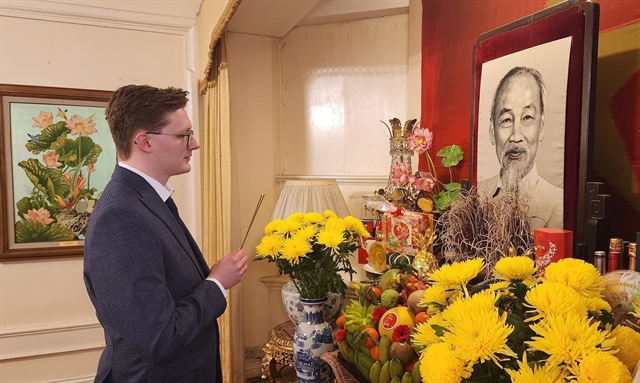 |
| Kyril Whittaker, British researcher of Vietnamese politics and history and member of the Communist Party of Britain (CPB), offers his respect to the late President Hồ Chí Minh at the Embassy of Việt Nam in the United Kingdom. — VNA/VNS Photo |
LONDON — The legacy of late Party chief Nguyễn Phú Trọng will, as part of Việt Nam’s revolutionary tradition, become part and parcel of building Việt Nam, and will continue in the work of the Party under the leadership of newly elected Party General Secretary Tô Lâm.
This remark was made by Kyril Whittaker, British researcher of Vietnamese politics and history and member of the Communist Party of Britain (CPB), in a recent interview granted to Vietnam News Agency (VNA) correspondent in the UK.
Kyril Whittaker said General Secretary Tô Lâm studied at both the Hồ Chí Minh National Academy of Politics and the People’s Security Academy, and has been actively involved in various government and security roles throughout his lifetime.
To this extent, his wealth of experience and studies have prepared him well for the role of State President and now General Secretary of the Communist Party of Việt Nam (CPV).
The legacy of late Party General Secretary Nguyễn Phú Trọng will be taken by the Party in a similar way it did to the legacy of previous generations of leaders and theorists such as Hồ Chí Minh, Lê Duẩn and Trường Chinh, to move forward, Whittaker said as he cited the commitments made by General Secretary Tô Lâm in his inauguration speech to “building the Vietnamese socialist rule-of-law state of the people, by the people and for the people” and “continuing implementing effective patriotic emulation movements; fighting corruption; tightening the relations between the Party and the people and promoting the parties revolutionary traditions”.
Speaking about the fight against corruption in Việt Nam, Whittaker believed it would be carried out diligently and effectively under the leadership of General Secretary and State President Tô Lâm, who is also head of the central steering committee for prevention and control of corruption and misconduct. He has played a major role in the recent cases where corrupt persons were discovered and given punishment.
Pointing to Tô Lâm’s knowledge and experience in the anti-corruption campaign under the tenure of late party leader Nguyễn Phú Trọng as well in public security and law, Whittaker believed the new leader will be able to continue this campaign to effectively stamp out corruption at all levels while ensuring that the Party remain steadfast in its adherence to revolutionary ethics. Internationally, the researcher has seen himself how friends outside of Việt Nam are impressed by the anti-corruption campaign and its effects.
Commenting on five priorities of Việt Nam’s foreign policy as highlighted by General Secretary and President Tô Lâm, Whittaker pointed out that these embody the characteristics of Trọng’s concept of bamboo diplomacy which promoted new win-win partnerships based on peaceful cooperation and trust whilst retaining the independence of Việt Nam in its national sovereignty, defence and political ideology.
Assessing the implementation of the 13th Party Congress’s Resolution which set a goal for Việt Nam to become by 2030 a developing country with modern industry and high income per capita, the research said the country is on track to meet its targets as its economy and people’s living conditions are continuously improving year upon year.
He pointed out new infrastructure being built, such as Hà Nội’s metro network, which has recently expanded, as well as new roads and construction projects in rural areas that have ensured increased connectivity not just inside the country but also internationally, making easier transportation of goods and networks and ensuring the opening up of new markets and expansion of existing markets.
He stressed that all of this, however, is done with the primary idea in mind that policy must put the people first, not economic growth.
As a result, economic growth is produced because of the people’s centrality in politics and economy, unlike in some other countries where economic growth is placed before the people’s interest, and, in doing so, the people’s living standards fall and economic growth is difficult to muster.
Whittaker said the idea of the people’s centrality can also be seen in the article on building Việt Nam into a prosperous, democratic, equal and civilised country by Tô Lâm where he emphasised adhering to the Marxist-Leninist path, ensuring that Đổi Mới (Renewal) is continued with the people as the centre.
According to Whittaker, the article is a well-detailed summary of the road map for Việt Nam in the coming years, where Tô Lâm makes clear various challenges globally as well as nationally and encourages the Party to maintain its revolutionary traditions and continue to preserve unity while stressing the vital importance of revolutionary morality of “Continuing to intensify Party building and rectification; and resolutely and persistently fighting individualism, the degradation in ideology, ethics and lifestyle, corruption and negative phenomena in the Party”. — VNS
- Reduce Hair Loss with PURA D’OR Gold Label Shampoo
- Castor Oil Has Made a “Huge” Difference With Hair and Brow Growth
- Excessive hair loss in men: Signs of illness that cannot be subjective
- Dịch Vụ SEO Website ở Los Angeles, CA: đưa trang web doanh nghiệp bạn lên top Google
- Nails Salon Sierra Madre
 VnExpress News The News Gateway of Vietnam
VnExpress News The News Gateway of Vietnam





